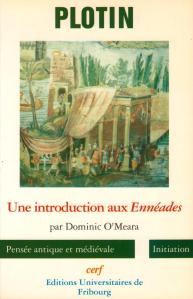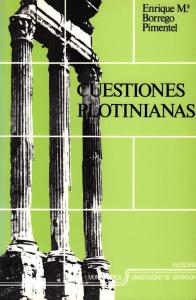 |
Mutmaßliche Darstellung Plotins auf einem Sarkophag
Presumed representation of Plotinus on a sarcophagus --- Museo Gregoriano Profano, Vatikanische Museen (wikipedia: Plotin) --- |
This essay in German >>>
Plotin und der Neuplatonismus:
Metaphysik und Erfahrung - Mystik und Philosophie
Plotin und der Neuplatonismus:
Metaphysik und Erfahrung - Mystik und Philosophie
This ontological level must be crossed in order to reach the comprehensive (metaphysical) unity of being.
Little is known about the life of Plotinus. We learn from him by his student Porphyrios (c. 233 - 301/305), who wrote a biography of the philosopher.
Essential points of his life and work are:
From 244 Plotinus lived in Rome, where he founded and directed a school of philosophy. He wrote numerous texts which only became known after his death because his student Porphyrios, who divided his work into six themes in each case with groups of nine chapters (Enneaden). See details >>>
So he made the texts accessible to the public.
Neo-Platonism played an important role throughout Late Antiquity and the Middle Ages.
Especially named must here also the school of Proclus (412-485) in Athens.
Islamic and Christian philosophers and mystics also referred to them directly or indirectly in their confrontation with Aristotle.
The humanist Platonist Marsilio Ficino (1433-1499) translated Plotinus' writings into Latin between 1484-1486 and then commented them all from the perspective of his Christian Neo-Platonism.
Christian mysticism also adopted Neo-Platonic ideas. Thus many references can be found in Meister Eckhart's work to Plotinus (in connection with Dionysius Areopagita):
- Gunther Fenge: Plotin und Meister Eckhart -
über die Verwandtschaft im Denken der Einheit.
Vortrag im Studienkreis Meister Eckhart am 23.01.2012 - Signe Schneider: Die drei Stufen: Plotin, Dionysius und Meister Eckhart.Diplomarbeit, Universität Wien.
Philologisch-Kulturwissenschaftliche Fakultät 2011, 119 S. - Kurt Ruh: Die mystische Gotteslehre des Dionysius Areopagita.
Vorgetragen am 6. Februar 1987, 63 S.
BAYERISCHE AKADEMIE DER WISSENSCHAFTEN -
P H I L O S O P H IS C H - H I S T O R I S C H E K L A S SE .
S I T Z U N G S B E R I C H T E · JA H R G A N G 1987, H E F T 2 - Mehr zu Dionysios Areopgagita (frühes 6. Jahrhundert) >>>
- Elsayed Elshahed: Widerhall Plotins in der islamischen Philosophie
In: Europa und seine Muslime: Koexistenz im Schatten von Verschwörungstheorien.
Wien: Böhlau 2019,[549 S.], S. 279-280 - Hinrich Biesterfeldt: Arabischer Neuplatonismus
und islamische Theologie
– Eine Skizze. In Kleine Schriften von: Josef van Ess (3 vols), S. 2126-2143Reihe: Islamic History and Civilization, Band: 137.Leiden: Brill 2018
Weitere Hinweise bei Amazon >>>
- An important neoplatonic is also Proclus (412-485)
Vgl.: Lucas Siorvanes:
Proclus. Neo-Platonic Philosophy and Science
Yale University Press 1996, XV, 315 pp., index - Mehr/more - Neuplatonismus / Neo-Platonism >>>(Neoplatonism, Stanford Encyclopedia of Philosophy)
Plotinus' teachings
(freely translated and commented from spiritwiki - Plotinus [German])
The One, the intellect and the soul. The focal points
of Plotinus' teachings are therefore:
- The interrelation of Ontology and Cosmology
- The essence of the One (neither being nor non-being,
but being beyond and beyond all conceptuality).
This can be experienced and thus reminds of the Buddhist Sunyata) - The Nous (mind, intellect) - the highest realm of being or substance (Ousia).
The ideas exist only within the Nous. - The hypostasis or reality level, the not sensually visible area of the soul.
- Matter and body world - beside the physical matter there exists a spiritual matter, which reminds of the lower Indian Maya worlds.
- Time and eternity with reference to Plato's Timaeus
- The ethics - acquisition and cultivation of the virtues (aretaí) as a central concern
- The soul as individualization of the world - soul in the corporal world and its descent and ascent. Living with the body is an evil for the soul.
- Logic - five categories based on Plato's Sophistes
- The confrontation with gnosticism
The prerequisite for this saw Plotinus in a consistently philosophical way of life. Happiness is not based on external goods, but exclusively on the perfect life, i.e. the optimally realized philosophical way of life.
 |
Plotins Schriften. Hamburg: Felix Meiner 1956 |
- Gesamttext der Enneaden (zeno.org) >>>
- Texte und Kommentare von und zu Plotin bei academia.edu >>>
- Luciana Gabriela Soares Santoprete (Universität Wien):
Publications on PLOTIN, Late Antiquity, Gnosicism and und Manicheaism
 |
Cover: Szene am Nil, römisches Mosaik
im antiken Präneste, heute: Palestrina (Latium) Italien Cover: Scene on the Nile, Roman mosaic in ancient Praeneste, today: Palestrina (Latium) Italy |
- Dominic O'Meara: Une introduction aux Ennéades.
Traduit de l'anglais par Anne Callet-Molin.
Fribourg (CH): Editions Universitaires /Paris: Cerf 1992, 193 pp., index
Contents of English original-edition >>>
 |
Plotinische Fragen / Plotinian Questions
|
- Enrique María Borrego Pimentel: Curstiones Plotinianas.
Biblioteca Teologica Granadina. Granada: Facultad de Teología 1994, 227 pp.
Índice / Inhaltsverzeichnis / Contents



Keine Kommentare:
Kommentar veröffentlichen